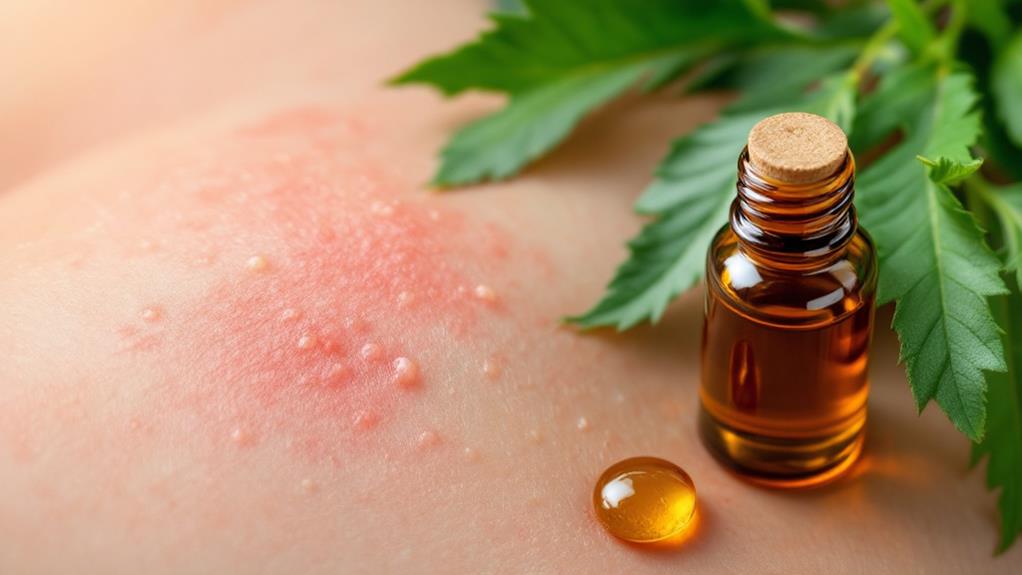Tea Tree Oil Side Effects: What You Need to Know Before Using It

Before using tea tree oil, be aware of its potential side effects. It can cause skin irritation like redness, dryness, or itching, especially if applied directly without dilution. Prolonged use may lead to dermatitis, so perform a patch test initially. Ingestion is highly toxic and can result in severe symptoms like confusion and nausea; thus, keep it away from children and pets. People with eczema or allergies should be cautious and consult a healthcare provider. Even with these considerations, tea tree oil remains popular for its benefits, and there's more to investigate about its safe and effective use.
Understanding Tea Tree Oil
In understanding tea tree oil, you'll find it's derived from the leaves of the Melaleuca alternifolia tree, which is native to Australia. Renowned for its antiseptic properties, tea tree oil is packed with active compounds like terpinen-4-ol, offering antimicrobial, antifungal, and anti-inflammatory effects. These attributes contribute to its therapeutic benefits, making it a popular choice among vital oils for addressing a range of skin conditions.
However, it's important to be aware of its potential side effects. When considering tea tree oil for topical application, you might encounter skin irritation or allergic reactions, especially if your skin is sensitive. To mitigate these risks, it's advisable to perform a patch test before fully incorporating it into your skincare routine. Simply apply a small amount on a discreet area and wait to see if any adverse reactions occur.
Though tea tree oil offers numerous benefits, never ingest it, as it can be toxic and lead to severe consequences like confusion or coma. By understanding these factors, you can safely harness the powerful therapeutic benefits of tea tree oil while minimizing the risk of unwanted side effects.
Common Uses and Applications
While understanding tea tree oil's potential side effects is crucial, its common uses and applications highlight why it's a staple in many households. Known for its adaptable nature, tea tree oil is frequently used to address a range of skin conditions. If you're battling acne, a 5% tea tree oil gel might be your answer. It's been shown to be as effective as benzoyl peroxide when applied twice daily for 45 days.
Tea tree oil shines in fungal treatments too. A 100% solution has cured toenail fungus in 20% of cases and improved symptoms in 66% of users after 3-6 months. For athlete's foot, a 10% tea tree oil cream works in the same manner as tolnaftate, with higher concentrations clearing infections in about half of the users.
You'll also find tea tree oil's antimicrobial properties beneficial in household products. It's a natural disinfectant, perfect for cleaning surfaces and fabrics. Regarding head lice, combining tea tree oil with other treatments like lavender oil has proven effective against lice eggs.
- Acne treatment: 5% tea tree oil gel
- Fungal treatments: 100% solution for toenail fungus
- Household uses: Antimicrobial properties for disinfecting
These varied applications make tea tree oil a valuable enhancement to your home remedies.
Potential Side Effects

Tea tree oil isn't without its drawbacks, and being aware of potential side effects is essential. While it's a popular natural remedy, it can cause skin irritation, such as dryness, itching, stinging, and burning, especially if you have sensitive skin or allergies. Prolonged use might lead to contact dermatitis, so it's wise to do a patch test to catch any allergic reactions before going all in.
If you're thinking about inhaling tea tree oil vapors, be cautious. It can lead to respiratory irritation, particularly in spaces that aren't well-ventilated. The most significant warning, though, is about internal ingestion. Never ingest tea tree oil, as it's toxic and can cause severe side effects like confusion, coma, and gastrointestinal distress.
Moreover, excessive use can mess with your hormones, potentially causing imbalances like gynecomastia, especially in young boys. This highlights the significance of proper dosage management. When using tea tree oil, moderation is key. Understanding these potential side effects helps you make informed decisions, ensuring you reap the benefits of tea tree oil without encountering its less desirable consequences. Always prioritize safety and health when incorporating it into your routine.
Skin Reactions and Irritations
When applying tea tree oil to your skin, be mindful of potential reactions and irritations. Many people experience skin irritation with symptoms like redness, dryness, itching, and stinging, especially if they're sensitive individuals. To avoid these unpleasant effects, it's wise to perform a patch test initially. This simple step can help you identify if you're susceptible to allergic contact dermatitis before you apply the oil more broadly.
Prolonged use of tea tree oil can lead to dermatitis, so it's essential to monitor your skin closely during extended treatments. If you notice any signs of irritation, it might be time to reconsider your approach.
To minimize the risk of irritation:
- Dilution: Always dilute tea tree oil with a carrier oil to reduce its potency and prevent severe irritation.
- Patch Test: Perform a patch test to check for allergic reactions before full application.
- Sensitive Skin: If you have eczema or other skin conditions, proceed with caution as tea tree oil might worsen your symptoms.
Risks of Ingestion

Ever wondered why ingesting tea tree oil is so dangerous? It's because tea tree oil contains compounds that are highly toxic when swallowed, leading to severe poisoning. You might experience serious symptoms like confusion, dizziness, or even coma. Gastrointestinal distress, including nausea and vomiting, is common, and these symptoms can escalate quickly, warranting immediate medical treatment. In 2022, Poison Control handled over 2,200 cases of tea tree oil exposure, with more than 10% requiring urgent care due to the severity of their reactions.
The toxicity of tea tree oil means it's essential to keep it far away from children and pets, who are particularly at risk of accidental ingestion. The health risks associated with swallowing tea tree oil are significant and shouldn't be underestimated. If you or someone else ingests it, you should immediately consult Poison Control. Prompt consultation can be lifesaving, as timely intervention helps manage the life-threatening reactions that may arise. Remember, oral consumption of tea tree oil is never safe, and awareness of these risks can prevent unnecessary exposure to its harmful effects. Always prioritize safety and take the necessary precautions to protect your household.
Precautions for Safe Use
Before incorporating tea tree oil into your skincare routine, it's important to take several precautions to guarantee its safe use. Initially, always perform a patch test on a small area of your skin to check for any allergic reactions or skin irritation. This step is vital, especially if you have sensitive skin.
To minimize the risk of irritation or dryness, make certain to dilute tea tree oil with a carrier oil like coconut or jojoba oil. Never apply it directly to your skin without proper preparation. Avoid using tea tree oil on broken skin or open wounds, as this can lead to adverse reactions.
Here are some further precautions to take into account:
- Consult a healthcare provider: If you're pregnant, breastfeeding, or have underlying health conditions, speak to your healthcare provider to confirm that tea tree oil is safe for you.
- Keep it out of reach: Store tea tree oil away from children and pets to prevent ingestion, which can cause serious health complications, such as confusion and coma.
- Be cautious with application: Carefully monitor your skin's reaction, and if you experience any discomfort, discontinue use immediately.
Taking these steps can help guarantee that your experience with tea tree oil is both safe and beneficial.
Who Should Avoid It

Generally, certain individuals should steer clear of using tea tree oil due to potential risks. If you have autoimmune conditions like eczema or asthma, using tea tree oil might worsen your symptoms. It's best to avoid it or consult a healthcare provider. Pregnant or breastfeeding? You should definitely seek medical advice before trying tea tree oil since its safety in these instances isn't fully understood.
For those on prescription medications, it's vital to check with a doctor to ascertain there are no interactions with tea tree oil. If you have underlying health conditions, especially those affecting your skin or respiratory system, discussing your situation with a healthcare professional is wise before using any important oils. Allergic reactions are another concern. If you've had allergies to important oils or similar plant-based products, using tea tree oil could trigger severe reactions.
Recognizing Severe Reactions
Spotting severe reactions to tea tree oil is vital for your safety. When using this natural remedy, it's important to be aware of the signs of severe allergic reactions. Anaphylaxis is a life-threatening response that can occur, with symptoms like wheezing, throat swelling, and difficulty breathing. Immediate medical attention is necessary if these occur.
Skin irritation and allergic contact dermatitis are also concerns. Sensitive individuals might experience redness, itching, and swelling upon applying the oil. If you notice these symptoms, particularly if they affect large areas, it's time to stop using the oil and consult a healthcare professional.
Ingestion of tea tree oil poses another risk, as it can lead to serious side effects. These include confusion, coma, and gastrointestinal distress, underscoring the oil's toxicity when consumed. If ingestion occurs, contacting Poison Control is imperative to manage potential complications.
Here's a quick checklist to help you recognize severe reactions:
- Anaphylaxis symptoms: Wheezing, throat swelling, difficulty breathing.
- Skin reactions: Redness, itching, swelling.
- Ingestion issues: Confusion, coma, gastrointestinal distress.
Understanding these signs can help you act promptly and avoid further complications.
Consulting Healthcare Professionals
When considering the use of tea tree oil, a consultation with a healthcare professional can be your best safeguard against potential risks. If you're dealing with underlying health conditions, pregnant, or breastfeeding, this step becomes essential. Tea tree oil might interact with prescription medications you're currently taking, so consulting a healthcare professional will help you understand any possible interactions or side effects.
Your healthcare provider can guide you on safe application methods, ensuring you use the appropriate dosage to minimize risks. They might recommend a patch test under their supervision to check for allergic reactions or sensitivities before you apply tea tree oil more broadly. This precaution helps prevent adverse effects that could arise from unexpected reactions.
Should tea tree oil prove ineffective or lead to complications, healthcare professionals can suggest alternatives or supplementary treatments tailored to your needs. Regular monitoring and open communication with your healthcare provider can effectively address any side effects, adjusting the treatment plan as necessary. Don't hesitate to seek professional advice; it's a proactive step in using tea tree oil safely and ensuring it fits well within your comprehensive health strategy.




